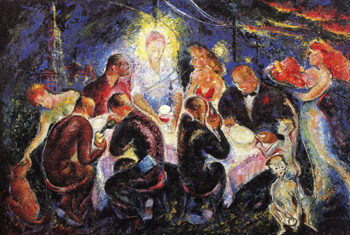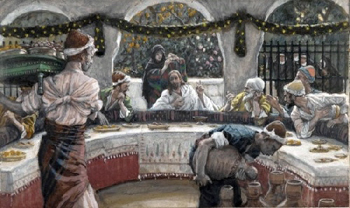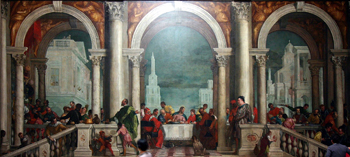For Sunday September 1, 2019
Lectionary Readings (Revised Common Lectionary, Year C)
Proverbs 25:6-7
Psalm 112
Hebrews 13:1-8, 15-16
Luke 14:1, 7-14
Jesus wasn't known for his politeness around the dinner table. Though the Gospels record him receiving and accepting many dinner invitations during his years of ministry, those mealtime scenes usually ended in provocation, insult, or scandal. Once, a woman of dubious reputation caressed his feet under the table. More than once, he interrupted a meal to heal sick people on the Sabbath. Often, he ate with dirty hands, shared a table with riff-raff, and drank more than his enemies considered respectable. Worst of all — he said things. Blunt, embarrassing things no one cared to hear. (Incidentally, this is why I laugh when I hear people say, “It doesn’t matter if Jesus was divine or not. All that matters is that he was such a nice person.” Um, no, he wasn’t.)
This week's lectionary reading from the Gospel of Luke describes just such a not-nice scene. Jesus is invited for a Sabbath meal by a leader of the Pharisees. Arriving early, he sits and watches as his fellow guests scramble for places of honor around the table. If I'm imagining the scene correctly, they jostle and shove each other, feigning dignity while still fighting for prestigious spots near the host.
After observing their drama for a while, Jesus calls them out with a parable. Knowing full well the social rules of his day, he shuns them and calls for a revolution. Not a revolution in arms, but a revolution in table manners.
"When you are invited by someone to a wedding banquet, do not sit down at the place of honor," he exhorts his fellow guests. "Go and sit down at the lowest place, so that when your host comes, he may say to you, 'Friend, move up higher.'" "For all who exalt themselves will be humbled, and those who humble themselves will be exalted."
 |
If that isn't counter-cultural enough, Jesus then turns to his host and continues: "When you give a luncheon or dinner, do not invite your friends or your brothers or your relatives or rich neighbors, in case they may invite you in return, and you would be repaid. But when you give a banquet, invite the poor, the crippled, the lame, and the blind. Then you will be blessed, because they cannot repay you."
Our reading this week doesn't tell us how Jesus's listeners reacted. I don't know if they laughed in discomfort, shook their heads in disbelief, questioned Jesus's sanity, argued back, or followed his advice. All I know is how I react as I read and re-read this story. I feel an uncomfortable combination of surprise, skepticism, and fear. As in: Really? Is Jesus serious? Does he have any idea what he's asking?
It appears he does. Every once in a while, just as I'm growing comfortable with my faith, a story like this one comes along to mess with my complacency. Don't exalt myself? Don't massage my Facebook page to make my life look perfect? Don’t judge my worth (or the worth of others) based on dress size, zip code, academic accomplishments, or professional titles? Don’t maximize my social capital at every opportunity? Ignore the pecking order — or worse — upend it? Don't network, don't schmooze, don't jostle for attention? Open my heart and home to people who can do nothing for me? People I have no affinity for? People I can't impress or earn favors from?
Why on earth should I do that?
Because Jesus insists on it. Because this is what God wants from us. God, the Great Reverser of our priorities, our hierarchies, and our values. God, who turns us inside out and upside down because there is no end to the miserable human game of who is "in" and who is "out," and God in his wisdom knows that our anxious scramble for greatness will lead to nothing but more anxiety, more suspicion, more loneliness, more hatred, and more devastation.
 |
Though we have such a hard time believing it, Jesus insists that God's kingdom is not a kingdom of scarcity; it is one of abundance, where all are already welcome, already loved, already known, and already cherished. The currency of that kingdom is humility, not arrogance; generosity, not stinginess; hospitality, not fear. The table at the center of that kingdom has so many seats — all of them premier seats, all of them first-class seats, all of them honorable seats — that we don’t have to scramble and exhaust ourselves to secure a good spot anymore.
But let's face it: humility is a tricky thing. We too easily conflate it with self-effacement, low self-esteem, and complicity in the face of oppression. Even if we manage to define it in healthy ways, humility betrays us; the very instant at which I claim humility is the moment when it eludes me. Worse, very little in our culture rewards or supports the humble. Whether we're talking entertainment, politics, sports, or even religion, we in Western cultures have an unhealthy admiration for the loudest, the biggest, and the greatest. Whether we recognize it or not, we are known around the world for idolizing the superlative. What would happen to our discourse if we shunned the words "most” and “best?" What would we have left?
The sad truth is that Western cultures — and American culture in particular — is not known around the world for its humility. The sadder truth is that historic Christianity itself, especially as it has been practiced in the West, is not known around the world for its humility. This is a sad and costly state of affairs. A legacy we must own, grieve, and make right.
 |
When we dare to gather at Jesus's table, we are activitely protesting the culture of upward mobility and competitiveness that surrounds us. There's nothing easy or straightforward about this; it requires hard work over a long period of time. To eat and drink with God is to live in tension with the pecking orders that define our boardrooms, our college admissions committees, our church politics, and our presidential elections, and that can be tiring. But it's what we're called to do — to humble ourselves and place our hope in a radically different kingdom.
Jesus asks us to believe that our behavior at the table matters — because it does. Where we sit speaks volumes, and the people whom we choose to welcome reveal the stuff of our souls. Favor the ones who cannot repay you. Prefer the poor. Choose obscurity. This is God's world we live in, and nothing here is ordinary. In the realm of God, the ragged strangers at our doorstep are the angels.
Debie Thomas: debie.thomas1@gmail.com
Image credits: (1) Ben Sternke; (2) www.scienceofcorrespondences.com; and (3) Wikipedia.org.





